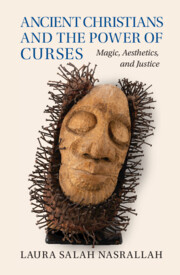Book contents
- Ancient Christians and the Power of Curses
- Ancient Christians and the Power of Curses
- Copyright page
- Dedication
- Contents
- Figures
- Plates
- Preface
- Acknowledgments
- Abbreviations
- Note on the Cover
- Introduction: Curses, Religion, Aesthetics
- 1 Making Justice
- 2 Substance and Story
- Interlude
- 3 Tongues, Breath, Stutter
- 4 Incantation
- Conclusions
- Ancient Sources
- Bibliography
- Index of Ancient Sources
- Index
- Plate Section (PDF Only)
Introduction: Curses, Religion, Aesthetics
Published online by Cambridge University Press: 02 June 2024
- Ancient Christians and the Power of Curses
- Ancient Christians and the Power of Curses
- Copyright page
- Dedication
- Contents
- Figures
- Plates
- Preface
- Acknowledgments
- Abbreviations
- Note on the Cover
- Introduction: Curses, Religion, Aesthetics
- 1 Making Justice
- 2 Substance and Story
- Interlude
- 3 Tongues, Breath, Stutter
- 4 Incantation
- Conclusions
- Ancient Sources
- Bibliography
- Index of Ancient Sources
- Index
- Plate Section (PDF Only)
Summary
Someone had it out for a garland weaver named Karpimē Babbia, a low-status woman who lived in Corinth in the late first or early second century CE. Chthonic Hermes, the goddess Anankē or Necessity, and the justice-exacting Fates are called upon to bring monthly destruction to her entire body, head to toe. Someone – a ritual practitioner with a client, most likely – made this curse by inscribing letters onto a thin lead tablet (Figure 0.1). What they wrote included rhythmic Greek, but also bubbled into a continuous stream of letters and sounds, the meaning of which is still unclear, which scholars call voces magicae: magical utterances. The curse-makers then rolled up the lead and pierced it with a nail, depositing it on or near a pedestal at the sanctuary of the goddesses Demeter and Kore, midway up the Acrocorinth, facing the busy city below and the blue of the Gulf of Corinth beyond.
Information
- Type
- Chapter
- Information
- Ancient Christians and the Power of CursesMagic, Aesthetics, and Justice, pp. 1 - 42Publisher: Cambridge University PressPrint publication year: 2024
